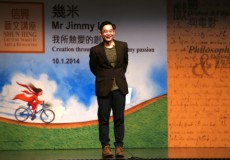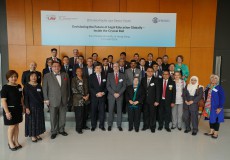|
|
 |
|
|
|
|
|
|
The campus is like a small community and a big family to its students, teachers and staff. Therefore, the wellness of each member of the campus is treasured by the University. With the hope of fostering a positive atmosphere of warmth and mutual care on campus so that those in need will get help and those who are able to help are willing to give a hand, a University-wide campaign “Sunshine at CUHK” has been launched.
The campaign has several purposes, including promoting mental wellness literacy through education and promotion, enhancing the University’s mental health supporting network, and sharing resources around the campus to foster a caring culture.
At the beginning of the semester, “Sunshine at CUHK” campaign organized a series of large-scale activities at the University Mall, including a talk on positive living, a meditation workshop, Qigong exercises and Zen-painting, which raised members’ awareness on mental health issues. Now, another wave of programmes is being rolled out by the campaign, which includes the “CU Angel”, “Sunshine at CUHK” website and a series of mental health activities.
With the belief that a simple offer of care brings hope to people in need, the “CU Angel” programme encourages participants to act as a guardian angel to those in need by simply listening to their troubles. A set of collaterals, including door knob hangers, name tag stickers and badges have been prepared. Participants can hang out or stick on these collaterals to become a “CU Angel”, telling anyone in need that they are willing and ready to listen to their stories. Students, teachers and staff are all encouraged to join the programme and make an effort in building up a caring campus amongst all CUHK members. Please check out the “Sunshine at CUHK” website (http://www.sunshine.cuhk.edu.hk/) for how to become a “CU Angel”.
“Sunshine at CUHK” website not only introduces mental health knowledge through videos, student sharing and useful tips, but also lists out the strong support network of the University, which is easily accessible to its members whenever they are in need. Upcoming mental wellness activities will also be updated in the website, including workshops for teachers and frontline staff on recognizing and giving help to the students in need.
|

|
|
|
|
|
|
Sir Terry Farrell, a world-renowned British architect and urban designer, whose Hong Kong projects include the Peak Tower and M+ Museum at the West Kowloon Cultural District, gave an inspiring lecture at the School of Architecture on 7 April. The well-received event attracted over 200 faculty members, students, alumni, architectural professionals and members of the public, expanding their horizons in both architecture and urban planning.
Titled “Urban Dialogue: The City as a Tangled Bank”, the lecture began by referring to Charles Darwin’s view that life is a “tangled bank”, where various plants and animals are dependent on each other in an enormously complex manner. For Farrell, this intricate ecosystem aptly represents the organic urban process and interconnected layering of a city.
Through drawings, diagrams, photos and masterplans, Farrell presented more than a dozen of his award-winning international projects spanning 50 years, offering insights into his contextual, proactive approach to architecture and urban planning that goes beyond iconic landmarks. Across diverse building typologies and infrastructures, such as mixed-use urban complexes, transport interchanges and significant institutions, the illustrated examples included: London’s MI6 Building, famously featured in several James Bond movies; Embankment Place, an office and shopping complex above Charing Cross station; the Peak Tower, his firm’s first project in Hong Kong; and the upcoming M+ Museum at the West Kowloon Cultural District, in partnership with Herzog & de Meuron and Arup.
The video of this lecture is now available online for public view.
In addition to this lecture, there will be exhibitions, workshops and a forum to be held in April to celebrate the Golden Jubilee of Sir Terry Farrell’s professional practice as well as the Silver Jubilee of Farrell's office in Hong Kong. For registration and enquiries, please email urban.dialogue@farrells.com.hk.
|

|
|
|
|
|
|
The Croucher Foundation held the presentation ceremony of the Innovation and Senior Research Fellowship Awards on 13 April to honour distinguished scholars for their excellent scientific research achievements. Three top research academics from CUHK received the prestigious awards, including Prof. Rossa Chiu and Prof. Jun Yu from the Faculty of Medicine and Prof. Jonathan Choi from the Department of Electronic Engineering.
Prof. Rossa Chiu, who was awarded a Croucher Senior Medical Research Fellowship, is the Choh Ming-Li Professor of Chemical Pathology and Assistant Dean (Research) at the Faculty of Medicine. Best known for her contributions in the development of non-invasive prenatal testing for Down syndrome, Prof. Chiu and her research team have recently achieved another breakthrough in blood based cancer detection. The latest approach, termed plasma DNA tissue mapping, is akin to performing a computerized tomography scan using blood samples. This new technology can not only detect abnormal DNA associated with cancer, but also locate which organ the abnormal DNA is coming from.
Prof. Jun Yu, who received the Croucher Senior Research Fellowship, is from the Department of Medicine and Therapeutics. She is also the Director of the Research Laboratory of Institute of Digestive Disease, and Associate Director of the State Key Laboratory of Digestive Disease. Recently, Prof. Yu and her research team have demonstrated some major discoveries in the pathogenetic mechanisms of non-alcoholic fatty liver disease (NAFLD), which will comprehensively depict the molecular landscape of NAFLD by using unbiased systems biology approaches, thereby finding out the preventative and curative treatments.
Prof. Jonathan Choi is the first recipient from CUHK to receive the Croucher Innovation Award. He specializes in the interactions of nanoparticles with the body across the length scales of organ, tissue, cell, and organelle. His mechanistic research will inform useful ‘design rules’ for building more potent therapeutic nanoparticles. Prof. Choi previously reported novel ‘bio-nano’ interactions between nanoparticles and the kidney, which will aid the development of new delivery strategies to the kidney.
The Croucher Senior Research Fellowships scheme was first introduced in 1997. Up to now, a total of 23 scholars from CUHK have been awarded the Croucher Senior Research Fellowships since its inception.
|

|

Prof. Rossa Chiu (left) received the award of Senior Medical Research Fellowship | 
Prof. Jun Yu (left) received the award of Senior Research Fellowship | 
Prof. Jonathan Choi (left) received the Innovation Award |  |  |  |  |  |  | |
|
|
|
|
This message is sent from Communications and Public Relations Office (CPRO). For enquiries related to this message, please contact CPRO at cpr@cuhk.edu.hk.
|
|


















































